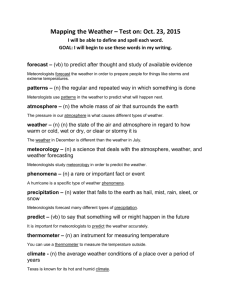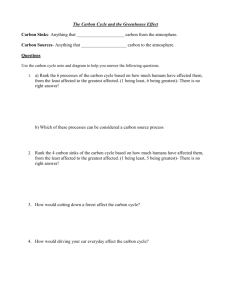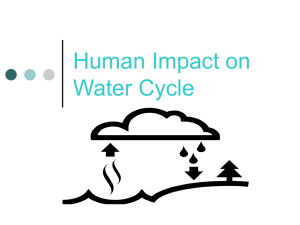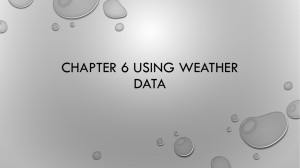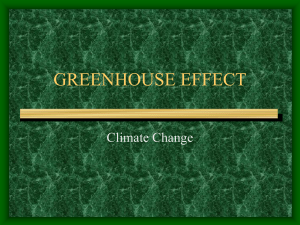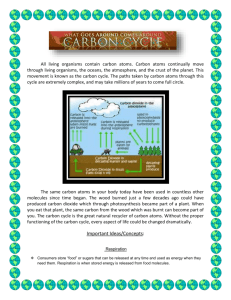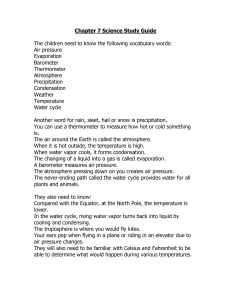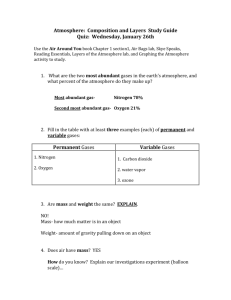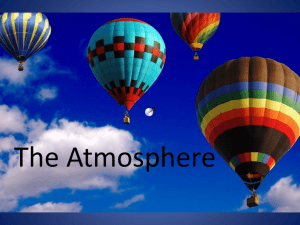Weather is the mix of events that happen each day in our
advertisement
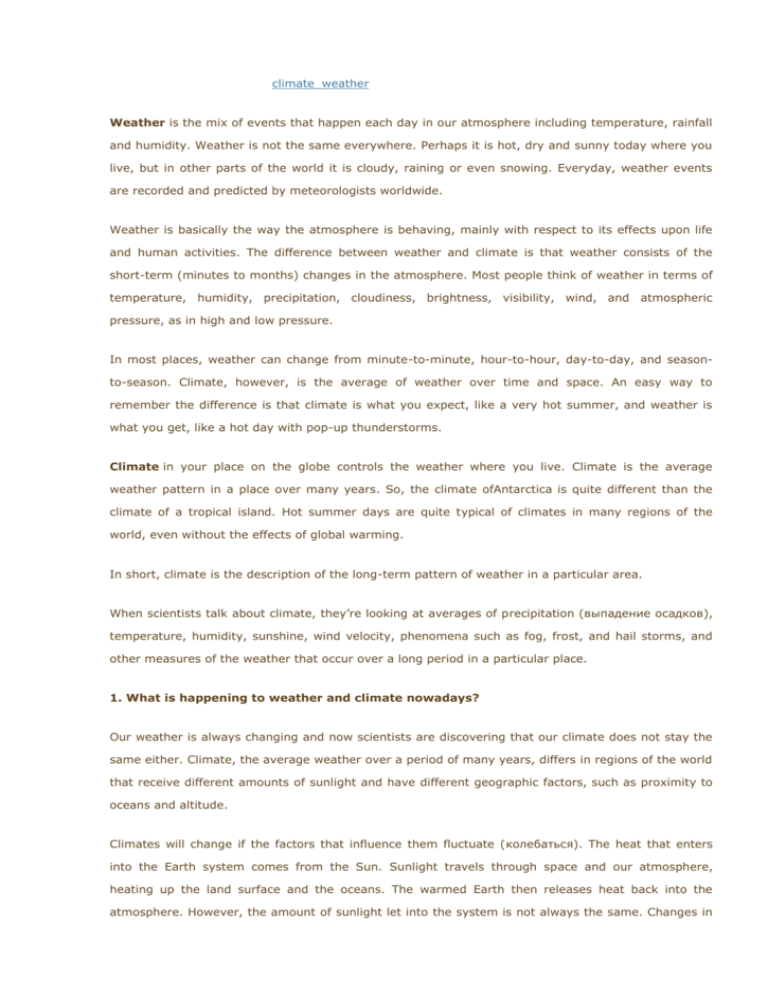
climate_weather Weather is the mix of events that happen each day in our atmosphere including temperature, rainfall and humidity. Weather is not the same everywhere. Perhaps it is hot, dry and sunny today where you live, but in other parts of the world it is cloudy, raining or even snowing. Everyday, weather events are recorded and predicted by meteorologists worldwide. Weather is basically the way the atmosphere is behaving, mainly with respect to its effects upon life and human activities. The difference between weather and climate is that weather consists of the short-term (minutes to months) changes in the atmosphere. Most people think of weather in terms of temperature, humidity, precipitation, cloudiness, brightness, visibility, wind, and atmospheric pressure, as in high and low pressure. In most places, weather can change from minute-to-minute, hour-to-hour, day-to-day, and seasonto-season. Climate, however, is the average of weather over time and space. An easy way to remember the difference is that climate is what you expect, like a very hot summer, and weather is what you get, like a hot day with pop-up thunderstorms. Climate in your place on the globe controls the weather where you live. Climate is the average weather pattern in a place over many years. So, the climate ofAntarctica is quite different than the climate of a tropical island. Hot summer days are quite typical of climates in many regions of the world, even without the effects of global warming. In short, climate is the description of the long-term pattern of weather in a particular area. When scientists talk about climate, they’re looking at averages of precipitation (выпадение осадков), temperature, humidity, sunshine, wind velocity, phenomena such as fog, frost, and hail storms, and other measures of the weather that occur over a long period in a particular place. 1. What is happening to weather and climate nowadays? Our weather is always changing and now scientists are discovering that our climate does not stay the same either. Climate, the average weather over a period of many years, differs in regions of the world that receive different amounts of sunlight and have different geographic factors, such as proximity to oceans and altitude. Climates will change if the factors that influence them fluctuate (колебаться). The heat that enters into the Earth system comes from the Sun. Sunlight travels through space and our atmosphere, heating up the land surface and the oceans. The warmed Earth then releases heat back into the atmosphere. However, the amount of sunlight let into the system is not always the same. Changes in Earth’s orbit over thousands of years and changes in the Sun’s intensity affect the amount of solar energy that reaches the Earth. Heat exits the Earth system as the Earth’s surface, warmed by solar energy, radiates heat away. However, certain gases in our atmosphere, called greenhouse gases, allow the lower atmosphere to absorb the heat radiated from the Earth’s surface, trapping heat within the Earth system. Greenhouse gases are an important part of our atmosphere because they keep Earth from becoming an icy sphere with surface temperatures of about0°F. However, over the past century or so the amounts of greenhouse gases within our atmosphere have been increasing rapidly, mainly due to the burning of fossil fuels, which releases carbon dioxide into the atmosphere. Consequently, in the past one hundred years global temperatures have been increasing more rapidly than the historic record shows. Scientists believe this accelerated heating of the atmosphere is because increasing amounts of these greenhouse gases trap more and more heat. The reason studying climate and a changing climate is important, is that will affect people around the world. Rising global temperatures are expected to raise sea levels, and change precipitation and other local climate conditions. Changing regional climate could alter forests, crop yields, and water supplies. It could also affect human health, animals, and many types of ecosystems. Deserts may expand into existing rangelands, and features of some of our National Parks and National Forests may be permanently altered. 2. Are you weather dependent? If you are talking about my mood I will say “Yes”, if you are talking about my physical state – the answer will be “No”. 3. What questions would you ask a meteorologist? - What do meteorologists do? - Where do you work? - How often are you mistaken? - Have you got any punishment for your mistakes? 4. What can you advise a person who wants to become a meteorologist? When we hear the word “meteorologist,” we often think of the person on the television screen who tells us about tomorrow’s high and low temperatures and precipitation. Many radio and television weathercasters are professional meteorologists, but others are reporters who are passing on information provided by the National Weather Service or private weather forecasters. A meteorologist is a person with specialized education “who uses scientific principles to explain, understand, observe, or forecast the earth’s atmospheric phenomena and/or how the atmosphere affects the earth and life on the planet.” This education usually includes a bachelor’s or higher degree from a college or university. Many meteorologists have degrees in physics, chemistry, mathematics, and other fields. The broader term “atmospheric science” often is used to describe the combination of meteorology and other branches of physical science that are involved in studying the atmosphere. So I can advise a person to study physics. 5. They say there’s no bad weather, there are bad clothes. What do you think about it? Actually, the English sayings about weather are numerous. And there is an objective reason for the popularity of this topic. The English weather on the whole is the naughtiest thing in the world. It’s because of the geographical position of theBritish Isles. Nevertheless people try to adopt themselves to the weather so as to live in harmony with it. And sometimes they even make use of the situation having an opportunity to change their clothes more often. Though O. Wilde said, “Whenever people talk to me about the weather, I always feel certain that they mean something else.” Personally I think each weather or season of the year possesses its own charm, has its own beauty and significance to man.
